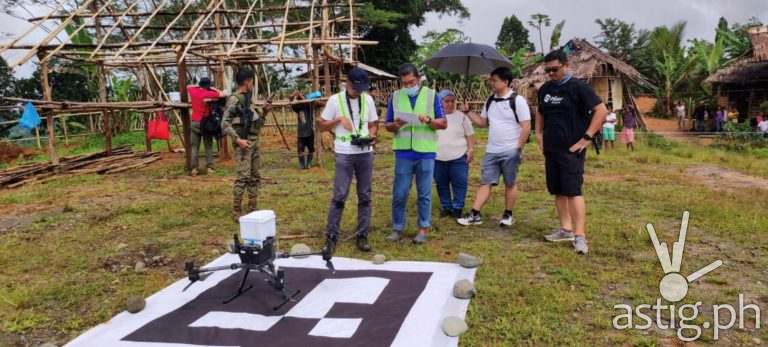MANILA, Philippines – Pharmaceutical company, Pfizer, partnered with a number of agencies and organizations to launch a project that would see crucial medicines and vaccines easily delivered by drone to an isolated rural Mindanao community in the town of San Luis, Agusan del Sur.
The partnership also includes Geneva-based nonprofit drone organization WeRobotics, innovation solutions company Philippine Flying Labs, and the provincial government of Agusan del Sur in Mindanao.
The initial pilot run saw drone pilots, with at least 1000 hours of drone training and flying experience, make deliveries of maintenance medicines, COVID-19 vaccines, medical equipment such as needles and syringes, and water samples for testing to the community of Kilometer 55, Barangay Binicalan in San Luis.
The project—which was first conceived in 2020 with technology originally field-tested in the Dominican Republic—took two years to plan, with the community chosen due to a real pressing need as the area can be cut off from roads during the rainy season, where the roads are impassable. The community is also prone to various public health concerns, such as diarrhea, malnutrition, hypertension, and diabetes due to its isolated and underdeveloped nature.
“We’re not here to replace any existing delivery service here, we are here to augment and enhance the current system,” said Dr. Heidi Sampang-Abiad, managing director at Philippine Flying Labs. “For example, the habal-habal costs P5000 to P6000 and can take up to five hours to go back and forth from the community. The system can also get limited by many factors, and the drones are reliable, and are a good addition to strengthen the last mile health service delivery in the country.”
“When this opportunity came up we quickly raised our hand and said yes, we want to be part of this program. We have a number of islands here that have difficulty accessing medicine, and we have resources that are willing to take part, who just want to help,” said Ken Millan, digital lead at Pfizer Philippines.
One of those areas with difficulty accessing medicines and other healthcare services is the town of San Luis, and this project is a promising step to addressing this concern. “We are grateful to our partners for this groundbreaking initiative,” said Gov. Santiago Cane Jr. “The Provincial Government of Agusan del Sur is open to innovative projects such as this one which can improve healthcare access to our isolated communities.”
After the completion of the pilot run, Pfizer hopes to continue developing the project through the establishment of partnerships with organizations to potentially take the project to other isolated communities around the Philippines.


